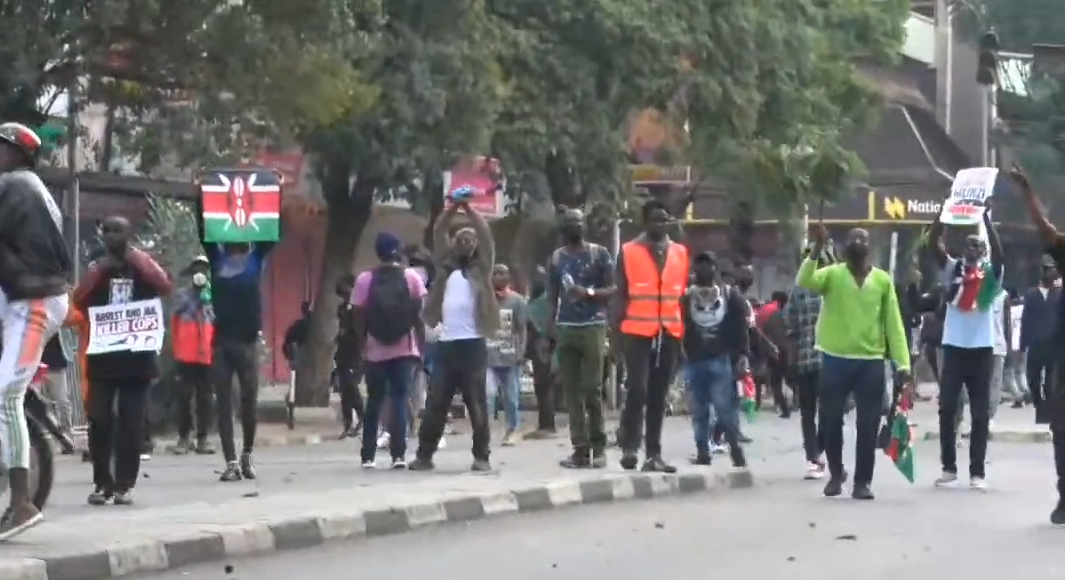Kenya is in the third consecutive year of a mass movement against austerity, falling living standards and police brutality, with the authorities having no answer to the crisis engulfing the country. Kenya has sunk deeper into a debt trap whereby its debt has ballooned from $16bn in 2013 to $68bn in 2022, and $90bn in 2025. Debt repayments cost 65% of annual revenue in 2023, with approximately 30% of revenue going on interest payments alone in 2025. Most of the debt is commercial debt denominated in Eurobonds and owed to the IMF and World Bank. Under direction from the IMF and World Bank, the Kenyan government is pressing ahead with privatising and selling off state assets, and attacking the living standards of the working class while using the police to crush any dissent.
Third year of youth-led protests
At least 67 people were killed during protests between March and July 2023. Over 60 people were killed during the Gen-Z protests in June and July 2024. Over 80 people who criticised the government have since disappeared, with dozens still missing.
Between 6 and 8 June 2025, school teacher Albert Ojwang was murdered by Kenyan police. Ojwang was ‘found unconscious’ in police custody. Ojwang had been arrested for allegedly criticising the police on his blog and social media. Police claimed he injured himself by banging his head against a wall in his cell. Yet Julius Juma, the family’s lawyer, reported ‘His body showed numerous injuries—to his head, hands, and shoulders. His head was completely swollen.’
On 9 and 17 June thousands of people took to the streets in outrage over Ojwang’s killing. They were met with brutality from the state and armed vigilante goons working alongside the police. A massive protest on 25 June across 27 of Kenya’s 47 counties, which was the first anniversary of the 2024 Gen-Z demonstrations, saw another 19 people killed, 179 arrests, 531 injuries and 15 disappearances. The Kenya National Commission on Human Rights has been documenting the protests and reported ‘the massive deployment of masked hired goons on motorbikes who patrolled the streets as they brutalized the protestors and innocent Wananchi with tyre whips, wooden bars and other crude weapons… hordes of thugs viciously attack and rob protestors and other civilians.’
Unbowed, thousands took to the streets again in 20 counties on 7 July 2025, the 35th anniversary of Saba Saba (Seven Seven), resulting in 38 people being killed by police. Saba Saba commemorates mass protests on 7 July 1990, which won multi-party elections from the state. This year, on 9 July, current president William Ruto called for police to ‘shoot protesters in the legs’ rather than kill them. Kenyan television channels were banned from covering the protests live.
Unprecedented Gen-Z movement
The historical protest movement is organised by the generational cohort known as Gen Z (born between the mid-1990s and early 2010s), and known as the first generation to be digital natives, having grown up with the internet and smartphones as integral parts of their lives, and which has shaped their communication style and preference for social media.
With no defined leaders and the movement cutting across ethnic and religious lines, the ruling class has struggled to contain the movement. Its demands are: a detailed audit of the national debt; scrapping illegitimate political offices and redirecting funds to health and education; sacking all corrupt ministers; providing free and accessible public healthcare; recalling Kenyan police forces deployed to Haiti; reducing all MPs’ salaries and allowances to 200,000 Kenyan Shillings so they don’t earn more than doctors; and for President Ruto to resign with immediate effect.
The Gen Z protests have already won a key victory in forcing Ruto to scrap the Finance Bill back in 2024, which proposed a 16% sales tax on bread, a 25% duty on cooking oil, and ‘eco-levies’ on harmful plastic products. Led by the youth, people mobilised against the bill despite brutal repression. These proposed measures were also dictated by the World Bank and IMF in 2021, demanding Kenya implement ‘fiscal consolidation and a tighter monetary policy’. In 2023, Kenya increased interest rates, eradicated a fuel subsidy to the poor, doubled VAT on petroleum products to 16%, and introduced a new housing tax of 1.5% for every employee. Kenyan workers now have a 2.75% health insurance tax deducted from their monthly incomes.
State sell-off
On 2 June, Ruto announced at the London Stock Exchange ‘We are committed to a programme that identifies and prepares a pipeline of key government assets to be privatised through the exchange’. 26 ‘poorly performing’ state corporations have been targeted for sale alongside Kenya Airways, Kenya Electricity Generating Company, Kenya Pipeline Company, Kenya Ports Authority, and four state-owned sugar factories. The private healthcare sector has also been expanded, with the public healthcare National Hospital Insurance Fund scrapped and replaced in 2023 by a privatised Social Health Insurance Fund.
Kenya has also expanded its use of Special Economic Zones or Export Processing Zones (EPZs) ostensibly to ‘increase investment, create jobs, and boost exports’. The number of EPZ firms in Kenya has expanded from 42 in 2010 to 165 in 2022. There are seven such EPZs in which investors enjoy 10-year tax holidays and VAT and customs duties deductions. Despite the massive profits made by these investors there is no evidence EPZs have boosted the Kenyan economy, as debt continues to balloon and living standards continue to fall. The Kenyan people have no choice but to fight back.
Charles Chinweizu
Fight Racism! Fight Imperialism! 307, August/September 2025




